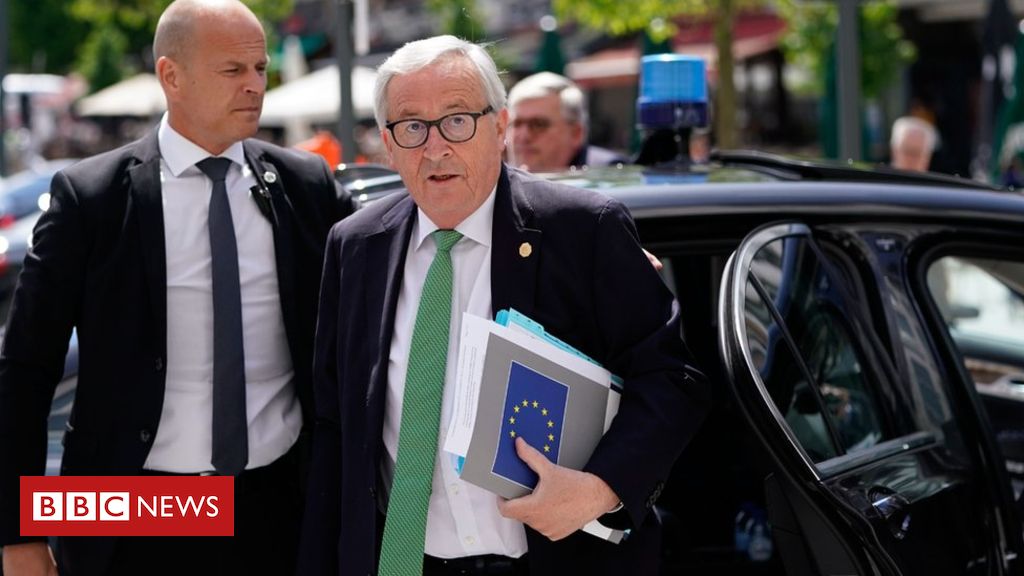Image copyright
AFP
EU Commission President Jean-Claude Juncker is one of those whose job is up for grabs
Signs of disagreement have emerged between France and Germany as EU leaders meet following elections that shifted the balance in parliament.
The talks are a chance to assess the new political landscape and consider candidates for the EU’s top jobs.
But the leaders of France and Germany have already suggested different figures to take over the key role of EU Commission president.
The vote saw the big centrist blocs lose their majority for the first time.
Nationalists, liberals and Greens all gained ground, leaving the EU more fragmented and the possibility of finding consensus more distant.
The talks over dinner on Tuesday may not even result in a shortlist of candidates and the haggling is likely to take months.
UK Prime Minister Theresa May is participating, but Brussels sources say there will be little or no discussion of Brexit.
Who will take over at the Commission?
It is far too early to say. Negotiations are likely to be long and tricky, with several candidates in the mix.
The role of Commission president, the body that enforces EU rules and drafts EU law, is currently held by Jean-Claude Juncker, who is at the end of his five-year term.
Media playback is unsupported on your device
In 2014 Mr Juncker was chosen to head the Commission as the centre-right European People’s Party (EPP) candidate, after the EPP had won the election.
But it is a much tougher challenge this time for the EPP’s candidate Manfred Weber – a German – after his bloc shrank from 217 seats to 180 in the 751-seat parliament.
Arriving in Brussels, Mrs Merkel said she “of course” backed Mr Weber, with her domestic party one of those in the EPP grouping.
But French President Emmanuel Macron did not even mention Mr Weber as a possible candidate, instead naming chief Brexit negotiator Michel Barnier, who is French, Danish liberal Margrethe Vestager and Dutch centre-left candidate Frans Timmermans as having the right “skills”.
Mr Timmermans has described the nomination process as like the brutal TV fantasy drama Game of Thrones.
Among other EU members, the leaders of Ireland and Croatia have backed Mr Weber, Spain and Sweden support Mr Timmermans while Luxembourg has spoken for Ms Vestager.
Time to negotiate – and compromise
The EU has committed to balance gender, political affiliation and geography when it fills its top jobs.
The leaders of the 28 member states will have to compromise with each other, and with MEPs who get to approve the choice. But this morning the European Parliament watered down its demands for the selection of the president of the European Commission, issuing a statement which says the winner only had to be someone “who made his/her programme and personality known prior to the elections, and engaged in a European-wide campaign”.
That potentially opens the door to candidates who weren’t strictly candidates before, such as Margrethe Vestager or maybe even Michel Barnier.
The previous front-runner Manfred Weber admits that his political family lost seats at the election which weakens his claim on the job.
There are also hints that the European Parliament will focus its efforts on defining the EU’s future direction, rather than seeking a powerful role in picking its personnel. A lot of names will come and go and rise and fall before the process eventually comes to an end later this year.
The other top EU officials to be replaced later this year are: European Council President Donald Tusk (Polish); European Central Bank President Mario Draghi (Italian) and EU High Representative for Foreign Affairs Federica Mogherini (Italian).
After lengthy negotiations, the new top officials will take up their posts on 1 November, except for the new European Council chief, who starts on 1 December.
Countdown to EU top jobs:
- May-June: Consultations between EU leaders and parliamentary groups
- 20-21 June: European Council decisions
- July: European Parliament votes on nominee for Commission president
- 1 November: New Commission president takes office, along with new High Representative and ECB president
- 1 December: New European Council President takes office
